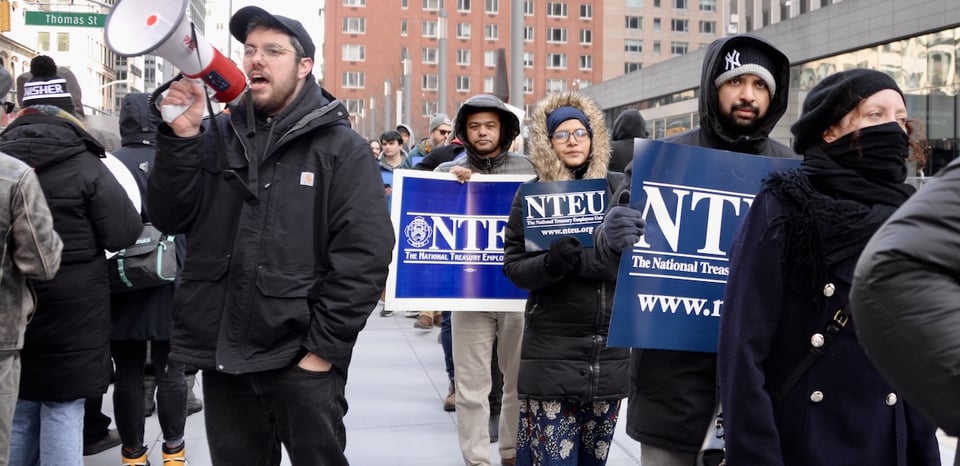Join the FUN
Dostoevsky famously wrote that “everything is permitted.” This is actually a question from Brothers Karamozov, where one brother Dmitri asks another “What will become of men then…without God and immortal life? All things are permitted then…?”
I think we’re in a moment education policy-wise where the question is pretty relevant. What was once thought to be immutable, unchangeable, and immortal just isn’t. All things appear to be permitted.
I’m talking of course about the incoming executive order from the Trump administration abolishing the Education Department (ED). The legal outlet Just Security posted a thorough analysis of what this means. I want to call attention to a small world in this piece: “cannot.” It occurs throughout the piece, but here’s a good example:
Can a President dismantle the Department of Education through an Executive Order?
No, Trump cannot dismantle the department by EO. Because the department was created by Congress, it can only be closed or its functions transferred by an act of Congress. Moreover, Congress has mandated that many programs specifically be administered by the Education Department. These programs can only be moved or abolished by an act of Congress.
You’ll see a lot of instances of this “cannot”: can he do that? No, he can’t do that. But what’s behind this cannot? A kind of legal theism that believes law and courts are immortally powerful, like the God in Dmitri’s question. If something’s against the law, then “Trump cannot.”
The word ‘can’ is the possible sense of the verb, uttered to delimit the bounds of possible action or thought. If we say that “Trump cannot” we mean that it’s impossible for Trump do or say a thing.
Unfortunately, the dictum that “everything is permitted” implies that yes, in fact, everything can be done. To believe otherwise is to remain in the world where God exists immortally, for instance.
Laura Booth, the author of the Just Security piece, keeps such a faith. The ED, she reminds us, is made of several offices that oversee programs: an office for elementary and secondary education that oversees Title 1A funding; an office for special education that oversees IDEA funding; an office for civil rights enforcement that oversees civil rights violations.
What these right wingers want to do is remove these functions from the ED and put them in other departments: ESE in Commerce, IDEA in HHS, OCR in DOJ. Then, slowly, they’ll wind down the funding these offices get, ultimately “returning education to the states.” She gives a good overview of why this is really bad:
eliminating Title I-A “would decimate more than 180,000 teacher positions and negatively affect the academic outcomes of 2.8 million vulnerable students across the country.” Louisiana would experience the greatest loss, with more than 12 percent of its teachers terminated; nearly 10 percent of teacher jobs would be lost in some states, including Alabama, Arizona, Mississippi, and Florida. Fewer teachers result in overcrowded classrooms, reduced school programs, and ultimately harm to students – particularly those in low-income communities.
And that’s just Title 1A.
Booth tries to assure us that, by law, according to Congress, these offices can’t be taken out of the ED.
But behind this “can’t” is that legal theism: that laws and Congress and the courts delimit and prohibit the right’s possible actions. We know that this ain’t necessarily so. Let’s talk first about the courts and then Congress.
There’s a big pinball machine at work as we speak where certain courts are making certain rulings about all kinds of things the Trump administration is doing.
Some rulings go against the administration. But then they appeal. Maybe the appeals court upholds the original ruling, sending the issue to the Supreme Court, controlled by right wingers. When these rulings go against the administration, which is only sometimes, it does in fact slow them down.
But let’s play this out. Remember a few weeks ago when there was talk of a constitutional crisis? What if the president and the executive branch violate a judicial branch court order? Well..at the very least, it’s a crisis. What happens in a crisis? It’s not like Russ Vought or Linda McMahon or anyone working for them will suddenly evaporate under the pure force of the courts upholding the law. They’ll find another path, keep trying, etc.
And what: do you really think the police are going to arrest them?
There’s something similar at work with Congress. Right wingers control Congress, but not a majority in the Senate. They could put legislation they want into a budget reconciliation though. Certain Senators have been urging the administration to put what they want in that bill so as not to mess with the courts. Boom: it becomes law.
Again, everything is permitted. Booth says Trump cannot, but I think ‘he’ can. (It’s not just Trump, it’s the right wing’s autocoup-control of the federal state apparatuses.)
What does this mean? Just in the same way that everything is permitted for right wingers, everything is also permitted for left wingers in their struggle against this onslaught. The things people like Booth and other liberal technocrats “can’t imagine” doing are, in fact, possible.
I don’t know what the strategy should be. But I know that collective action gets the goods and a legal-theistic faith is wrong for this moment.
I think mass unionization of the federal workforce is the best path forward. Everyone involved in this area and wants the autocoup to stop should join or support the Federal Unionists Network (FUN).
As they get organized, there are calls for a walkout on 3/14 and there appears to be interest in a national teacher sickout to protest the moves against the ED.
